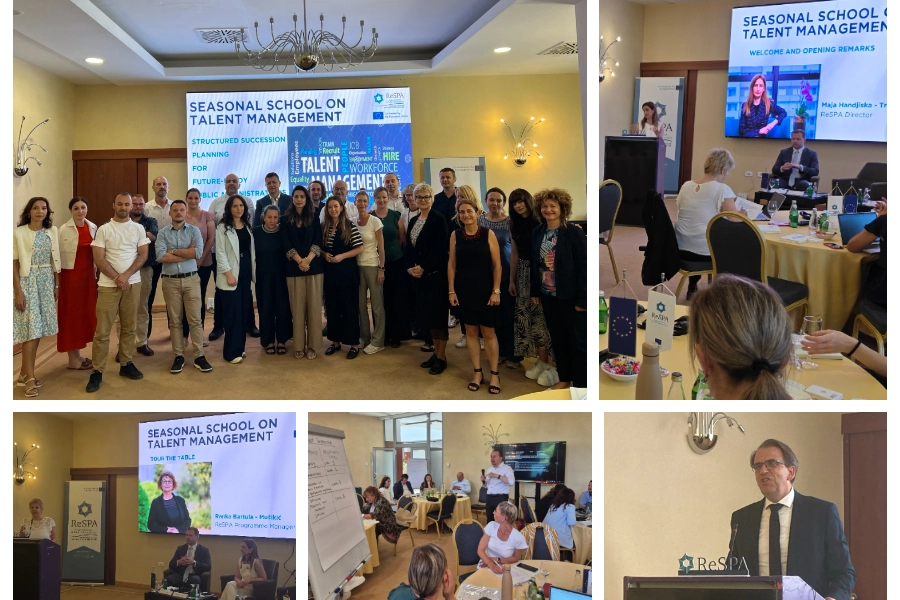
Seasonal School on Talent Management: Structured Succession Planning for Future-Ready Public Administrations
10-11 June 2025, Bar, Montenegro
Against the backdrop of sweeping administrative transformation and integration with the European Union, senior and mid-level public administration professionals from across the Western Balkans convened in Bar for the Seasonal School on Talent Management: Structured Succession Planning for Future-Ready Public Administrations.
The event served as a catalytic platform for governments aiming to overcome a long-standing challenge—the absence of structured and institutionalised succession planning frameworks—by equipping them with forward-thinking tools, case-based learning, and regional peer collaboration.
Organised as part of broader public sector reform initiatives, the Seasonal School was designed to help public institutions transition from reactive human resource practices to proactive talent cultivation and strategic workforce planning. With a special focus on the sustainability of institutional knowledge, leadership continuity, and competency-based HRM, the event aimed to:
- Enhance the capacity of HR professionals and decision-makers to manage succession proactively.
- Introduce and contextualise proven EU models from France and Estonia, and explore Slovenia’s emerging approach to succession planning.
- Co-create a Succession Planning Toolkit that reflects the realities of public sector institutions in the Western Balkans.
Public sector professionals were exposed to actionable strategies and tasked with applying new tools in simulations, laying the groundwork for a long-term cultural shift in how public service leadership is developed and sustained.
The Seasonal School gathered over 20 professionals from Civil Service Agencies, HR units of ministries and agencies, and public administration training institutions, all of whom had hands-on experience in applying competency-based HRM practices, such as performance management, training design, and job classification. Their collective expertise was a key asset throughout the programme, enabling in-depth peer exchanges and a nuanced understanding of how succession planning must be adapted to specific institutional and national contexts.
The curriculum was crafted to balance conceptual grounding with practical application. Facilitated by one international and one local expert, the event integrated:
- Lectures on the foundational principles of succession planning and New Public Governance.
- Case studies from EU countries, including both mature succession ecosystems and emerging practices Interactive exercises and simulations designed to learn how to translate theory into practice.
- Group work and co-creation sessions culminated in the early design phase of a perspective toolkit for succession planning, which can be adapted to administrations in the region.
Case Study: France - France’s approach showcased how institutional succession planning is embedded into governance structures. Emphasis was placed on predictive workforce planning, career development frameworks, and structured pipelines for senior civil service positions.
Case Study: Estonia - Estonia’s digital-first public sector provided inspiration for how data systems, AI-driven HR analytics, and continuous feedback mechanisms can enhance succession processes and streamline talent identification.
Case Study: Slovenia – Slovenia’s experience provided insights into the practical steps, challenges, and early successes of introducing succession planning in a public administration context that is still evolving.
Key sessions included:
- "Talent, What For?" – An interactive exercise exploring the disconnect between procedure-driven systems and evolving workforce challenges.
- Strategic Succession Planning – Participants examined frameworks that support long-term talent sustainability and organizational resilience.
- Operational Succession Planning – A detailed breakdown of tools, task sequences, and HR instruments used in successful succession initiatives.
- Case Studies – Real-world practices from France, Estonia, and Slovenia illuminated transferable lessons for institutional reform in the Western Balkans.
Highlights included:
- Leadership Risk Mapping – Identifying positions vulnerable to turnover and gauging leadership depth.
- Competency Identification – Assessing individual competencies and aligning them with future needs.
- Talent Development Planning – Exploring methods to nurture high-potential staff.
- Knowledge Retention Strategies – Evaluating approaches for preserving critical institutional memory during transitions.
- Succession Plan Design Simulation – Teams designed succession strategies for hypothetical institutions and received real-time feedback from peers and facilitators.
The final group presentations fostered a sense of shared purpose and showcased the innovative thinking emerging from the region.
A key output of the Seasonal School was the initial co-design of a prospective Succession Planning Toolkit, intended to serve as a living document that public institutions can adapt and refine over time. This toolkit aims to offer:
- Templates for risk mapping and competency assessments.
- Checklists for succession readiness.
- Guidelines for integrating digital tools into HRM functions.
- Recommendations for institutionalising succession planning policies.
The event concluded with the consensus that succession planning is not a luxury but a necessity for modern governance, especially in the Western Balkans, where institutional knowledge and leadership continuity are vital for sustaining reform momentum.



